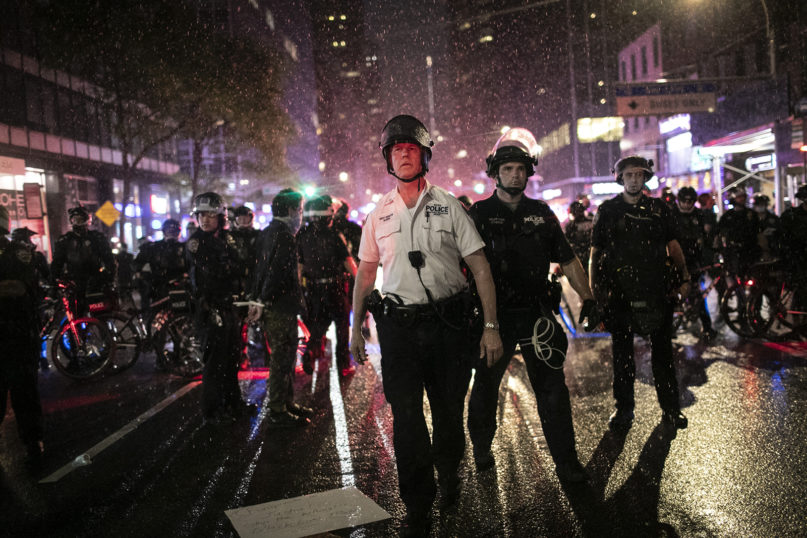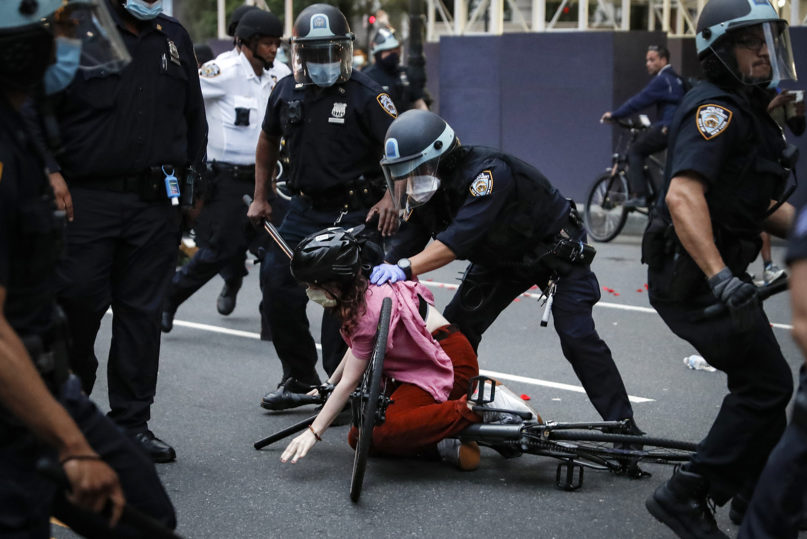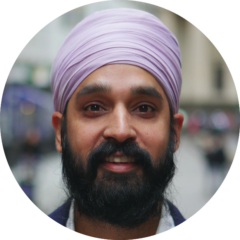(RNS) — Last night, I took part in a racial justice protest in New York City. It was lively and joyous and passionate — until police ran up from behind, cornered a group of us against a wall and detained us, assaulting people in the process.
The officers’ cause? We were breaking curfew.
Earlier in the day, I had received an email from the New York City mayor’s office that we had permission to be out past curfew because faith leaders were deemed essential. In the moment before the officers aggressively and excessively attacked us, there was no chance to invoke the mayor’s order.
I watched a young man holding a shofar, a Jewish ritual horn, tackled off his bike and the horn land next to his head. It’s not the same, but I couldn’t help but picture my turban lying on the ground.
I saw a petite woman thrown forcefully to the sidewalk by multiple cops as her friends pleaded for them to calm down. She was arrested and kept in handcuffs for six hours. She has bruises all over her body.
I was infuriated. Who are they protecting? Who are they serving?
nypd just ran up on us, cornered us, and assaulted several peaceful protestors. @NYCMayor — count me out of all your city leadership and interfaith programs going forward #BlackLivesMatter pic.twitter.com/rOm2SwSlZh
— Simran Jeet Singh (@SikhProf) June 4, 2020
A few years back, I was invited to sit in on a training session on unconscious bias with the leadership of the San Antonio Police Department. The atmosphere was tense the moment I walked into the room. I learned quickly why the officers felt upset, when one of them quipped: “Why are we being singled out for this training? We’re not racist, and it’s offensive that people keep calling us that.”
Many of the officers nodded in agreement. I realized in that moment that our biggest problem with confronting racism: It’s as pervasive as the air we breathe yet we are unwilling to accept that it ever enters our bodies.
The trainer told me she expected that the officers would be defensive. She figured her ideas would be better received if she made it less about policing in particular and more about our human psychologies.
She was right. The police officers let down their guards once they realized she wasn’t there to attack them personally or even as a community and that subconscious bias is something we all carry.
Studies show consistently that we start internalizing racist messages from infancy. We receive social cues throughout our lives about who is trustworthy and who is threatening.
It was not until my mid-20s that I accepted that these biases resided within me too. It was in acknowledging this truth that I could begin my own journey in becoming anti-racist.
There’s nothing wrong with having biases. It’s part of being human. We run into problems when we allow these biases to drive how we behave, whether consciously or subconsciously. This is when our biases become prejudicial.
Cops — like everyone else in our society — are socially conditioned to see black people as prone to criminal behavior and violence. It makes sense, then, that they would over-police black communities and disproportionately kill young, black men.
This is why, even if most officers were not consciously preying on black men and women, racial prejudice is at the core of our current policing crisis. Acting with prejudice is problematic in any context, but it is especially dangerous when it comes to policing in America. Our cops roam our cities with deadly weapons at their fingertips and fear in their hearts, armed with the knowledge that civilians often do not have the legal means to hold them accountable.
It’s not right, and it’s not acceptable, but it’s also easy to understand: Our racist policing is a symptom of a larger social failure in which we are all complicit.

Police advance to arrest protesters breaking curfew by marching through Manhattan on June 3, 2020, in New York. (AP Photo/Wong Maye-E)
Anti-black stereotypes also become embedded in law enforcement through policy. By sanctioning racial profiling measures like stop-and-frisk, our government encourages our officers to act on their prejudices. The implicit message is that we are all best served when we bring our anti-black biases into our actions. This is what we mean when we talk about institutionalized racism and systemic discrimination.
This is also what we mean when we talk about racist policing. It’s not about saying that all cops are racist, because again, we all are. It’s about acknowledging the histories and legacies these institutions have in preserving white supremacy. As scholars such as Sylvester Johnson, Michelle Alexander and Eddie Glaude have pointed out, many of our law enforcement agencies were formed in response to the end of slavery; the domination of black people is part of their structure.
To truly solve this problem is to be honest about our shared reality: American policing is racist.
This is why so many people around the country are rising up right now. We’re tired of racist policing. We’re tired of seeing our black siblings killed in the street. We want meaningful change and we want it now.
Whether that’s heeding the calls for police reform as we have seen by activists like Brittany Packnett Cunningham, or moving toward police abolition, as advocated by the likes of Angela Davis — I’m open to all of it. What I’m not open to is more of the same.
The recent protests sweeping around our country have brought up a lot of feelings for a lot of people, myself included. I feel hopeful and anxious, concerned and excited, pained and invested.
I feel inspired seeing people of all stripes coming together to demand justice. It’s been a long time coming, and there’s something comforting about knowing that so many people across the country and globe feel the same kind of passion and fire inside of me.
I wonder if our efforts will bring about the change we want, or if we will walk away feeling disappointed and frustrated. I go to bed every night wondering what tomorrow might bring.
What I do know is this: The killings of George Floyd and Breonna Taylor, and thousands of other unarmed black civilians killed by the police – as well as the excessive force used by police against peaceful protestors that I witnessed firsthand – have made me more certain than ever that those same institutions that claim to serve and protect us are also serving and protecting white supremacy.
I’m tired of that and ready for a signal shift in how we imagine policing in this country. It’s clear that millions of Americans feel the same way.






